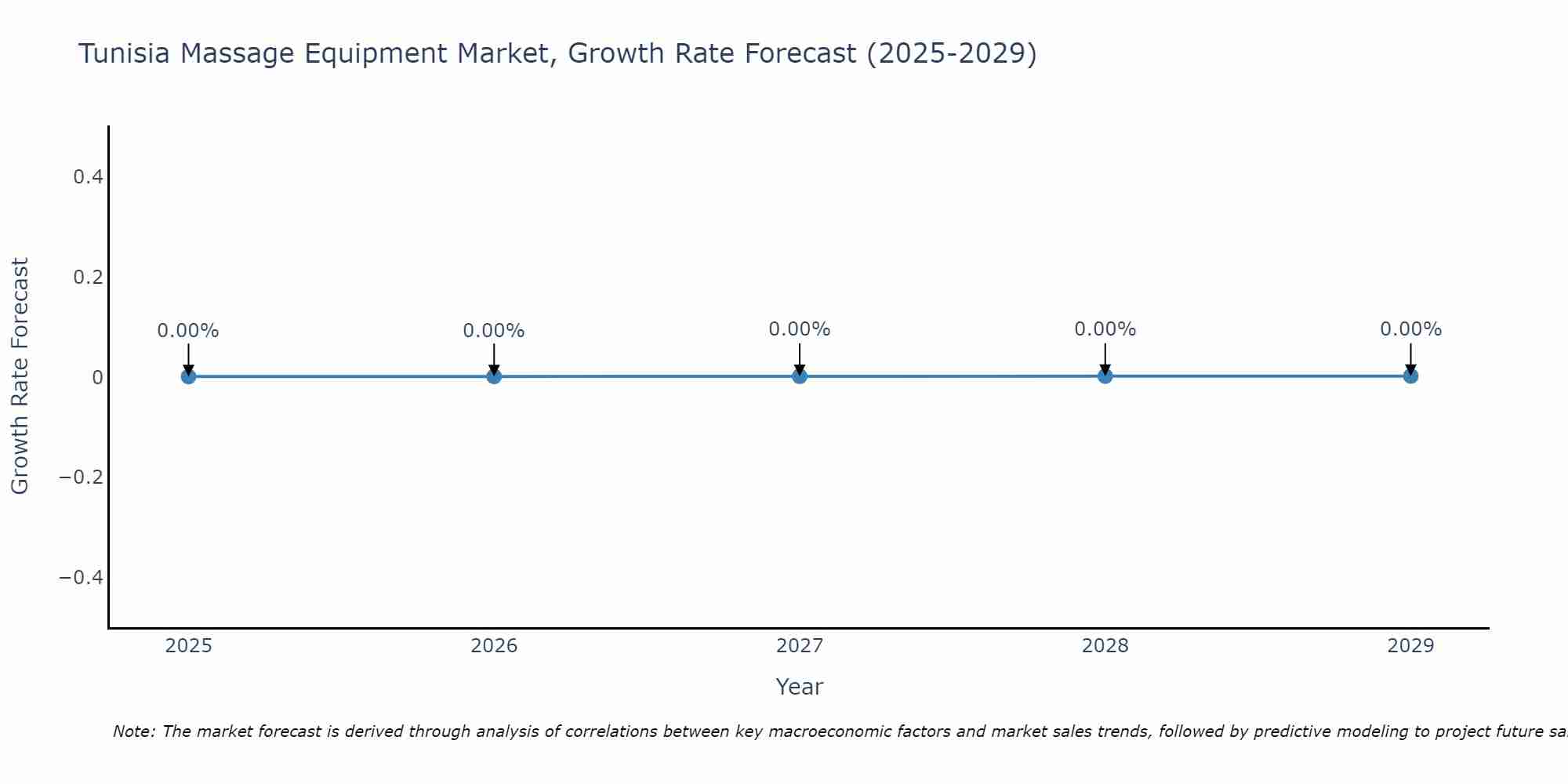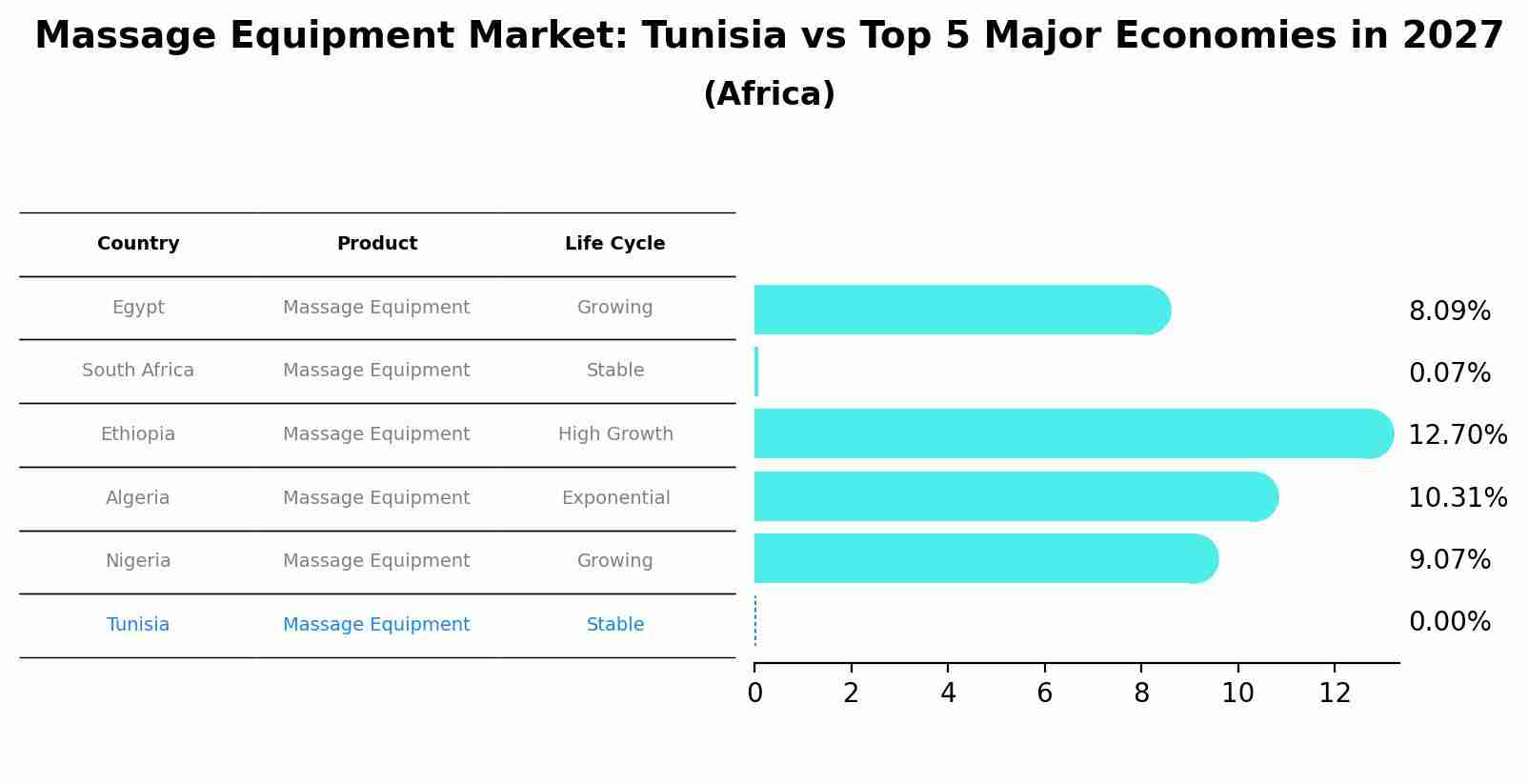Tunisia Massage Equipment Market Outlook | Size, Trends, COVID-19 IMPACT, Share, Revenue, Growth, Companies, Industry, Value, Forecast & Analysis
| Product Code: ETC366594 | Publication Date: Aug 2022 | Updated Date: Jul 2025 | Product Type: Market Research Report | |
| Publisher: 6Wresearch | Author: Sumit Sagar | No. of Pages: 75 | No. of Figures: 35 | No. of Tables: 20 |
Tunisia Massage Equipment Market Size Growth Rate
The Tunisia Massage Equipment Market is poised for steady growth rate improvements from 2025 to 2029. Commencing at 0.00% in 2025, growth builds up to 0.00% by 2029.

Massage Equipment Market: Tunisia vs Top 5 Major Economies in 2027 (Africa)
The Massage Equipment market in Tunisia is projected to grow at a stable growth rate of 0.00% by 2027, highlighting the country's increasing focus on advanced technologies within the Africa region, where Egypt holds the dominant position, followed closely by South Africa, Ethiopia, Algeria and Nigeria, shaping overall regional demand.

Tunisia Massage Equipment Market Synopsis
The Tunisia massage equipment market is experiencing steady growth driven by increasing awareness about the health benefits of massage therapy, rising disposable income, and a growing wellness tourism industry. Key players in the market offer a variety of massage equipment including massage chairs, handheld massagers, massage oils, and massage tables to cater to the diverse needs of consumers. The market is also witnessing a shift towards technologically advanced massage equipment that offer features such as adjustable settings, heat therapy, and various massage techniques. With the rising demand for relaxation and stress relief solutions, the Tunisia massage equipment market is expected to continue its growth trajectory, presenting opportunities for both domestic and international manufacturers to expand their presence in the market.
Tunisia Massage Equipment Market Trends
The Tunisia Massage Equipment Market is experiencing growth driven by the increasing awareness of the benefits of massage therapy for overall health and wellness. Consumers are seeking portable and convenient massage devices for use at home, leading to a rise in demand for handheld massagers and massage chairs. Additionally, there is a growing interest in advanced massage technologies such as electric pulse massagers and heated massage tools. With the trend towards self-care and stress relief, there is a shift towards investing in high-quality massage equipment for personal use. The market is also witnessing a surge in online sales of massage equipment, as consumers prefer the convenience of shopping from home. Overall, the Tunisia Massage Equipment Market is poised for further expansion as the demand for relaxation and self-care continues to rise.
Tunisia Massage Equipment Market Challenges
In the Tunisia Massage Equipment Market, challenges include limited awareness and education about the benefits of massage therapy, leading to slower adoption rates among consumers. Additionally, the relatively high cost of quality massage equipment poses a barrier for both consumers and businesses looking to invest in such products. Distribution and retail channels for massage equipment in Tunisia may be limited, making it difficult for manufacturers and suppliers to reach a wider audience. Furthermore, the lack of standard regulations and certifications within the industry may hinder consumer trust and confidence in the quality and safety of massage equipment available in the market. Overcoming these challenges will require targeted marketing efforts, partnerships with healthcare professionals to promote the benefits of massage therapy, and potentially investment in developing more affordable product options.
Tunisia Massage Equipment Market Investment Opportunities
The Tunisia massage equipment market presents promising investment opportunities due to the increasing awareness and demand for health and wellness products in the region. With a growing middle-class population and rising disposable incomes, there is a growing interest in investing in high-quality massage chairs, handheld massagers, and other massage equipment. Furthermore, the tourism industry in Tunisia, known for its spas and wellness resorts, provides a lucrative market for massage equipment suppliers. Additionally, the trend towards home-based self-care practices during the COVID-19 pandemic has led to a surge in demand for personal massage devices, creating a niche market opportunity. Investors can capitalize on this trend by offering innovative, user-friendly, and affordable massage equipment tailored to the Tunisian market preferences and consumer needs.
Jordan Agar Market Government Policies
The government of Tunisia has specific regulations in place for the massage equipment market to ensure consumer safety and quality standards are met. The Tunisian government requires all massage equipment to undergo testing and certification to ensure compliance with health and safety standards. Additionally, importers and manufacturers of massage equipment must obtain the necessary permits and licenses from relevant authorities to operate in the market. The government also closely monitors advertising and promotion practices in the industry to prevent false or misleading claims. Overall, the government`s policies aim to regulate and standardize the massage equipment market in Tunisia to protect consumers and maintain a level playing field for businesses operating in the sector.
Tunisia Massage Equipment Market Future Outlook
The Tunisia Massage Equipment Market is poised for steady growth in the coming years, driven by increasing awareness of the health benefits of massage therapy, rising disposable incomes, and a growing focus on self-care and wellness. The market is expected to benefit from a surge in demand for home massage equipment due to the convenience and cost-effectiveness it offers. Additionally, the rising number of spas and wellness centers in Tunisia is likely to drive the demand for professional massage equipment. Technological advancements in massage equipment, such as smart features and customizable settings, are expected to further propel market growth. Overall, the Tunisia Massage Equipment Market is anticipated to expand as consumers prioritize health and well-being, presenting opportunities for manufacturers and retailers to innovate and tap into this growing market segment.
Key Highlights of the Report:
- Tunisia Massage Equipment Market Outlook
- Market Size of Tunisia Massage Equipment Market, 2021
- Forecast of Tunisia Massage Equipment Market, 2031
- Historical Data and Forecast of Tunisia Massage Equipment Revenues & Volume for the Period 2018 - 2031
- Tunisia Massage Equipment Market Trend Evolution
- Tunisia Massage Equipment Market Drivers and Challenges
- Tunisia Massage Equipment Price Trends
- Tunisia Massage Equipment Porter's Five Forces
- Tunisia Massage Equipment Industry Life Cycle
- Historical Data and Forecast of Tunisia Massage Equipment Market Revenues & Volume By Product for the Period 2018 - 2031
- Historical Data and Forecast of Tunisia Massage Equipment Market Revenues & Volume By Chairs & Sofas for the Period 2018 - 2031
- Historical Data and Forecast of Tunisia Massage Equipment Market Revenues & Volume By Back Massagers for the Period 2018 - 2031
- Historical Data and Forecast of Tunisia Massage Equipment Market Revenues & Volume By Handheld for the Period 2018 - 2031
- Historical Data and Forecast of Tunisia Massage Equipment Market Revenues & Volume By Neck & Shoulder for the Period 2018 - 2031
- Historical Data and Forecast of Tunisia Massage Equipment Market Revenues & Volume By Others for the Period 2018 - 2031
- Historical Data and Forecast of Tunisia Massage Equipment Market Revenues & Volume By Application for the Period 2018 - 2031
- Historical Data and Forecast of Tunisia Massage Equipment Market Revenues & Volume By Commercial for the Period 2018 - 2031
- Historical Data and Forecast of Tunisia Massage Equipment Market Revenues & Volume By Home for the Period 2018 - 2031
- Tunisia Massage Equipment Import Export Trade Statistics
- Market Opportunity Assessment By Product
- Market Opportunity Assessment By Application
- Tunisia Massage Equipment Top Companies Market Share
- Tunisia Massage Equipment Competitive Benchmarking By Technical and Operational Parameters
- Tunisia Massage Equipment Company Profiles
- Tunisia Massage Equipment Key Strategic Recommendations
Frequently Asked Questions About the Market Study (FAQs):
- Single User License$ 1,995
- Department License$ 2,400
- Site License$ 3,120
- Global License$ 3,795
Search
Thought Leadership and Analyst Meet
Our Clients
Related Reports
- Afghanistan Apparel Market (2026-2032) | Growth, Outlook, Industry, Segmentation, Forecast, Size, Companies, Trends, Value, Share, Analysis & Revenue
- Canada Oil and Gas Market (2026-2032) | Share, Segmentation, Value, Industry, Trends, Forecast, Analysis, Size & Revenue, Growth, Competitive Landscape, Outlook, Companies
- Germany Breakfast Food Market (2026-2032) | Industry, Share, Growth, Size, Companies, Value, Analysis, Revenue, Trends, Forecast & Outlook
- Australia Briquette Market (2025-2031) | Growth, Size, Revenue, Forecast, Analysis, Trends, Value, Share, Industry & Companies
- Vietnam System Integrator Market (2025-2031) | Size, Companies, Analysis, Industry, Value, Forecast, Growth, Trends, Revenue & Share
- ASEAN and Thailand Brain Health Supplements Market (2025-2031) | Strategy, Consumer Insights, Analysis, Investment Trends, Opportunities, Growth, Size, Share, Industry, Revenue, Segments, Value, Segmentation, Supply, Forecast, Restraints, Outlook, Competition, Drivers, Trends, Demand, Pricing Analysis, Competitive, Strategic Insights, Companies, Challenges
- ASEAN Bearings Market (2025-2031) | Strategy, Consumer Insights, Analysis, Investment Trends, Opportunities, Growth, Size, Share, Industry, Revenue, Segments, Value, Segmentation, Supply, Forecast, Restraints, Outlook, Competition, Drivers, Trends, Demand, Pricing Analysis, Competitive, Strategic Insights, Companies, Challenges
- Europe Flooring Market (2025-2031) | Outlook, Share, Industry, Trends, Forecast, Companies, Revenue, Size, Analysis, Growth & Value
- Saudi Arabia Manlift Market (2025-2031) | Outlook, Size, Growth, Trends, Companies, Industry, Revenue, Value, Share, Forecast & Analysis
- Uganda Excavator, Crane, and Wheel Loaders Market (2025-2031) | Strategy, Consumer Insights, Analysis, Investment Trends, Opportunities, Growth, Size, Share, Industry, Revenue, Segments, Value, Segmentation, Supply, Forecast, Restraints, Outlook, Competition, Drivers, Trends, Demand, Pricing Analysis, Competitive, Strategic Insights, Companies, Challenges
Industry Events and Analyst Meet
Whitepaper
- Middle East & Africa Commercial Security Market Click here to view more.
- Middle East & Africa Fire Safety Systems & Equipment Market Click here to view more.
- GCC Drone Market Click here to view more.
- Middle East Lighting Fixture Market Click here to view more.
- GCC Physical & Perimeter Security Market Click here to view more.
6WResearch In News
- Doha a strategic location for EV manufacturing hub: IPA Qatar
- Demand for luxury TVs surging in the GCC, says Samsung
- Empowering Growth: The Thriving Journey of Bangladesh’s Cable Industry
- Demand for luxury TVs surging in the GCC, says Samsung
- Video call with a traditional healer? Once unthinkable, it’s now common in South Africa
- Intelligent Buildings To Smooth GCC’s Path To Net Zero


















